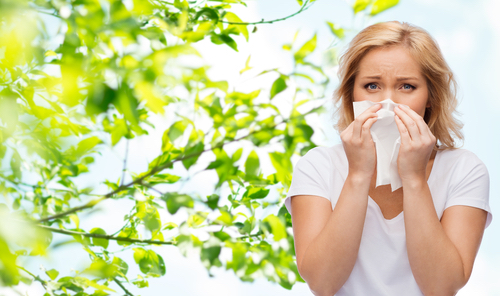


Spring is a beautiful time of year as the weather starts to warm up and trees and flowers begin to blossom. But for many people, this means an increase in pollen and hay fever symptoms.
Statistics show that approximately 1 in 5 Australians suffer from hay fever, and this is even more likely to occur if there is a family history of allergies including asthma or eczema.
The health experts at House Call Doctor say you can take steps to curb springtime allergies, from medication to household habits.
What is hay fever?
Otherwise known as allergic rhinitis, hay fever is an allergic reaction caused by environmental allergens such as pollens, dust mite, moulds and animal hair.
These allergens cause the mucous membranes of the eyes and nose to become inflamed, causing a runny nose and watery eyes.
What are the causes of hay fever?
The biggest spring allergy trigger is pollen. As trees begin to blossom, they release tiny grains into the air to fertilise other plants.
When the pollen enters the nose of someone who is allergic, it can result in hay fever symptoms.
These symptoms occur as the immune system mistakenly sees the pollen as a danger and releases antibodies to attack the allergens.
This leads to the release of histamines into the blood that trigger allergy symptoms.
Examples of hay fever triggers include:
- Tree pollen in the Spring
- Grass pollen in late spring and Summer
- Weed pollen, especially during Autumn
- Fungi and mould spores, more common in warm weather
- Pet hair
- Dust mites
What are the symptoms of hay fever?
Symptoms can start at different times of the year, depending on what environmental allergen you react to.
Common symptoms include:
- Sneezing
- Watery eyes
- Itchy throat
- A blocked, itchy, or runny nose.
Severe symptoms may include:
- Sweats
- Headaches
- Loss of smell and taste
- Facial pain caused by blocked sinuses
- Itchiness spreading from the throat to the nose and ears.
Diagnosis
To specify the correct treatment, House Call Doctor recommends consulting with your GP to get a blood or skin test to identify which substances you are allergic to.
In a skin test, the skin is pricked with a minute amount of a known allergen.
A blood test will show the level of lgE antibodies. This will be high if an allergy is present.
Increased risk of hay fever
There are a variety of factors that make you more susceptible to hay fever. These include:
- Genetic factors: If a close family member has hay fever or another allergy, the risk is increased
- Other allergies or asthma: If you have pre-existing allergies or asthma you are more likely to develop hay fever
- Gender and age: Hay fever is more common among boys before adolescence, but after adolescence, females are more affected
- Birth date: People born during the high pollen season have a slightly higher risk of developing hay fever
- Second-hand smoke: Exposure to cigarette smoke during the early years of life increases the risk of hay fever
Other factors include being the firstborn, coming from a smaller family or a higher-income family. These last three risk factors may be linked to childhood infections.
Treatment for hay fever
Although medications do not cure allergies, they can help reduce side effects. House Call Doctor recommends consulting with your GP about these medications to relieve hay fever symptoms:
- Antihistamine spray or tablet: Commonly available over the counter, these stop the release of the chemical histamine. They can relieve symptoms of a runny nose, itching, and sneezing.
- Eye drops: These reduce itching and swelling in the eyes
- Nasal corticosteroids: These sprays treat the inflammation caused by hay fever.
- Oral corticosteroids: Severe hay fever symptoms may respond well to prednisone tablets, prescribed by a doctor.
Home treatment
Although you cannot prevent the development of an allergy, you may find some strategies useful for minimizing the impact of hay fever.
Here are some tips you can use at home:
- Be aware of pollen count during susceptible months. Pollen counts tend to be higher on humid and windy, non-rainy days during the early evening. Information regarding pollen count is available through the Internet and other media
- Keep windows and doors shut when the pollen count is high
- Choose low-pollen days for gardening and keep away from grassy areas when pollen counts are high
- Regularly splash the eyes with cool water to soothe them and clear them of pollen
What now?
For treatment to be the most effective, it should be commenced three months before the season in which pollen spreads.
Continued effort towards treatment can reduce symptoms, improve immunity to the allergen, and enhance quality of life.
If you’re concerned with hay fever, House Call Doctor recommends consulting with your regular GP.




